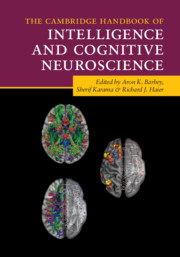Book contents
- The Cambridge Handbook of Intelligence and Cognitive Neuroscience
- Reviews
- The Cambridge Handbook of Intelligence and Cognitive Neuroscience
- Copyright page
- Dedication
- Contents
- Figures
- Tables
- Contributors
- Preface
- Part I Fundamental Issues
- Part II Theories, Models, and Hypotheses
- Part III Neuroimaging Methods and Findings
- Part IV Predictive Modeling Approaches
- Part V Translating Research on the Neuroscience of Intelligence into Action
- 18 Enhancing Cognition
- 19 Patient-Based Approaches to Understanding Intelligence and Problem-Solving
- 20 Implications of Biological Research on Intelligence for Education and Public Policy
- 21 Vertical and Horizontal Levels of Analysis in the Study of Human Intelligence
- 22 How Intelligence Research Can Inform Education and Public Policy
- 23 The Neural Representation of Concrete and Abstract Concepts
- Index
- References
21 - Vertical and Horizontal Levels of Analysis in the Study of Human Intelligence
from Part V - Translating Research on the Neuroscience of Intelligence into Action
Published online by Cambridge University Press: 11 June 2021
- The Cambridge Handbook of Intelligence and Cognitive Neuroscience
- Reviews
- The Cambridge Handbook of Intelligence and Cognitive Neuroscience
- Copyright page
- Dedication
- Contents
- Figures
- Tables
- Contributors
- Preface
- Part I Fundamental Issues
- Part II Theories, Models, and Hypotheses
- Part III Neuroimaging Methods and Findings
- Part IV Predictive Modeling Approaches
- Part V Translating Research on the Neuroscience of Intelligence into Action
- 18 Enhancing Cognition
- 19 Patient-Based Approaches to Understanding Intelligence and Problem-Solving
- 20 Implications of Biological Research on Intelligence for Education and Public Policy
- 21 Vertical and Horizontal Levels of Analysis in the Study of Human Intelligence
- 22 How Intelligence Research Can Inform Education and Public Policy
- 23 The Neural Representation of Concrete and Abstract Concepts
- Index
- References
Summary
Neuroscientific theories of intelligence view intelligence as localized in the brain (e.g., Barbey, 2018; Duncan et al., 2000; Haier, 2016). It would be hard to disagree with the idea that intelligence is somehow localized in the brain. Aside from reflexes, intelligent human behavior emanates from the brain, which in turn is affected by a variety of bodily systems. But is intelligence 100% biological, as Haier (2016) at least claims, or is there some benefit in viewing intelligence through a larger lens? Is the argument over whether intelligence is 100% biological even worth having?
- Type
- Chapter
- Information
- Publisher: Cambridge University PressPrint publication year: 2021

